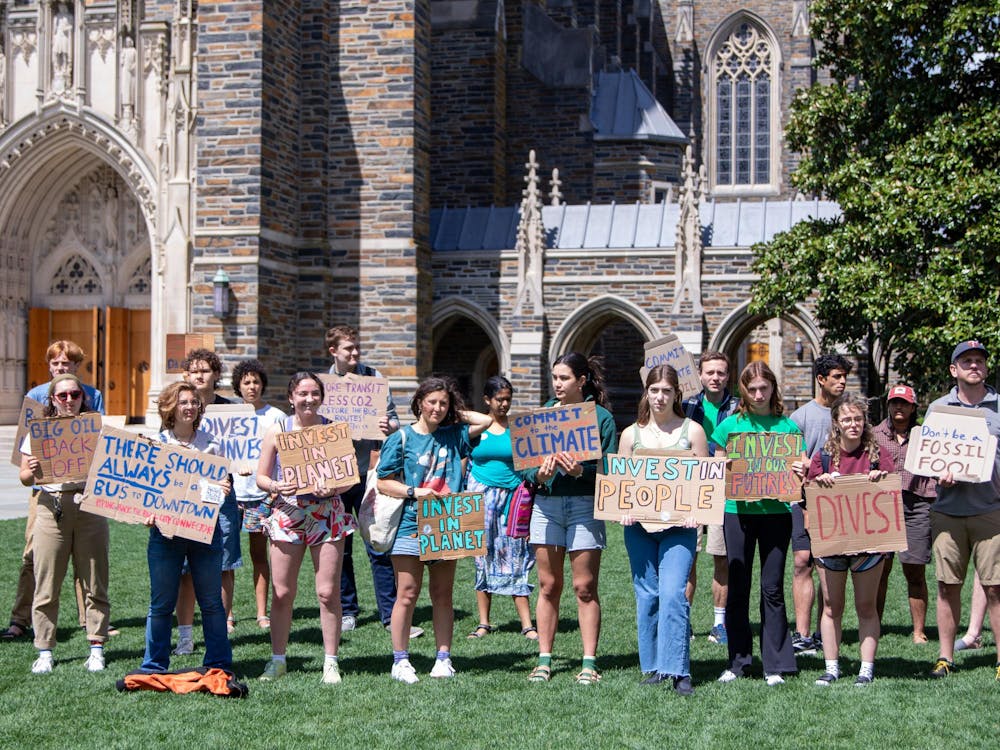As Duke Climate Coalition reflects on a year of activism, its student leaders express optimism even as the University remains rigid on divestment.
This year, DCC’s activism included publishing a report on the extent of Duke research funded by the fossil fuel industry, holding multiple protests to demand the University cut ties with fossil fuel companies and sending over 50 students to a rally in New York City where they called on President Joseph Biden to declare a climate emergency.
According to DCC co-president, senior Abby Saks, the student-run environmental advocacy organization is calling for Duke to “divest from fossil fuels and other destructive industries.”
The University announced the Climate Commitment in September 2022, which began with the support of a $36 million gift. The initiative pledged to unite University resources to solve climate change goals in key focus areas. Still, Saks believes the University has been hesitant to meet their demands.
“In terms of legitimate action from the Duke administration on divestment, I don't think we've seen anything substantial or tangible,” Saks said.
Fellow DCC co-president, senior Brennan McDonald, agreed that administration hasn’t moved much on divestment. However, he believes “administrators are more open about talking about these things than they have been in the past.”
Saks said DCC is also expanding its divestment goals to include private prisons, the “military-industrial complex” and other sectors “related to environmentalism and environmental justice.”
Saks and McDonald noted that DCC is limited by the frequent turnover of its student leaders, pointing to this obstacle as a challenge for initiating change.
“[University administration has] really, intentionally or not, used the fact that we’re only here for four years to their advantage. In terms of delaying us, they took over a year to respond to our report,” Saks said of the Advisory Committee on Investment Responsibility. “A year and three months — that’s a third of our time at Duke.”
ACIR, which advises President Vincent Price on investment decisions, released a report on Feb. 16 recommending the University against divestment from fossil fuels.
The DCC criticized this report in an April 2 column in The Chronicle, calling for the University to make “concrete goals and systemic changes instead of only advertising its Climate Commitment.”
Prior divestment activism at Duke
Some student movements in favor of divestment have been successful in the past at Duke.
In 1969 during the Vietnam War, student activists hosted demonstrations calling for Duke to divest from Dow Chemical Company, the sole manufacturer of napalm used in chemical warfare campaigns against Vietnam. At the time, Duke owned 5,000 shares of stock in the company. Duke later announced its divestment.
In the 1980s, efforts led by the Duke South Africa Coalition resulted in Duke’s divestment from all holdings in South Africa by May 1986.
In 1985, divestment activists held a week-long symposium to educate the Duke community on apartheid in South Africa. Beyond the symposium, activists protested through the windows of the Allen Building, demanding divestment.
In 1986, the activists organized a protest in which they constructed a makeshift “Apartheid Prison” on Abele Quad. Six Duke students and one alumnus were arrested in the aftermath and charged with trespassing.
Afterward, then-president Keith Brodie created a timetable for total divestment from South Africa of $12.5 million in stocks and bank deposits.
In 2007, student groups came together to send a letter to ACIR demanding that Duke divest its holdings in Sudan amidst human rights violations in Darfur.
In 2008, the Board of Trustees passed a resolution prohibiting Duke from making any future investments in the country until the U.S. lifted its sanctions against the country.
Get The Chronicle straight to your inbox
Sign up for our weekly newsletter. Cancel at any time.
The past and future of the fossil fuel divestment campaign
The push for Duke to divest from fossil fuels accelerated in 2012 when environmentalist Bill McKibben gave a talk on campus about the numbers behind climate change. He concluded that to stop temperatures from rising two degrees celsius, institutions should divest from the top 200 fossil fuel companies, thus incentivizing a market shift toward clean energy alternatives.
The talk inspired students to form the first version of DCC: Divest Duke. Students used petitions, flyers and worked to revive ACIR in their pursuit of divestment, but were ultimately unsuccessful in influencing then-President Richard Brodhead to divest from the fossil fuel industry.
Now, McDonald and Saks said that they feel particularly hopeful about their movement. They described having several meetings at the end of the semester with administrators to discuss DCC’s goals.
McDonald explained that the incoming leadership is composed of rising sophomores, which he believes will help the campaign’s longevity.
The co-presidents also mentioned that they focused a lot on recruitment this year, hoping to pass institutional knowledge onto a new group of students. Saks compared the mentorship structure within DCC to “big-little” relationships in Greek life.
“Activism, in general, is notorious for burnout,” Saks said. “… We focus on having more of a community where we’re empowering each other.”
Olivia Schramkowski is a Trinity junior and was formerly a staff reporter for the news department.

Ava Littman is a Trinity sophomore and an associate news editor for the news department.

